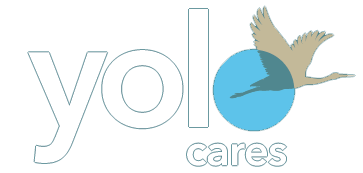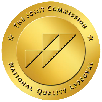Ten years in . . . and we’re just getting started
By: Craig Dresang, CEO, YoloCares
Originally posted on the Davis Enterprise on September 15, 2024.
A longtime colleague who runs a large healthcare organization in the Washington DC area recently asked me, “What is the most valuable thing you’ve fostered in your organization?” Needing no time to think, I immediately responded: Culture and stick-to-itiveness.
Ten years ago this month, my husband and I moved from Chicago to California and I opened a new professional chapter at YoloCares. The transition during the early years was far from easy, but my previous leadership experience, and some outstanding mentors along the way, had prepared me well to navigate some rough waters and to begin the journey of both protecting this community healthcare treasure and positioning it for a new era of stability, evolution and growth.
One of the biggest challenges was figuring out how to move an under-resourced and under-staffed agency from point A to point B and C without jeopardizing quality of care or an ability to serve as a regional safety net for the sickest and most vulnerable folks in our communities. Admittedly, I was naïve about the length of time that it would take for meaningful change to take root. The old adage, “Good things take time, and better things take a little longer,” has certainly proven true for the agency once known as the “Birkenstocks and socks hospice.” However, over the years we have been intentional about keeping elements of the comfortable, casual, nontraditional energy that originally sparked YoloCares into existence. In fact, integrating that “Birkenstocks and socks” spirit into the organization’s culture, delivery of care, decision-making processes, and visioning has set the agency apart from a tidal wave of competition.
A decade ago, YoloCares had little competition in Yolo County and less than a dozen competitors in its five-county service area. Today, the agency competes with more than 60 hospice providers . . . most of them are backed by private equity and designed to turn a quick profit for owners and investors. Under that model, service, quality and community grounded-ness can easily take a back seat or appear nonexistent. Several hospice companies have been sold, resold, and resold again, each time with a new round of investors looking to maximize profit from people in crisis.
Pushing back on forces that sought to eliminate YoloCares as a competitor, along with enormous challenges related to a changing healthcare environment, the agency had to get serious and get busy in order to meet those challenges. We had to do more than survive . . . we had to chart a course to thrive into a future that seemed unclear.
To that end, the first milestone the agency had to clear was to become accredited by the Joint Commission, the gold standard of accrediting bodies in healthcare. The second goal was to expand its range of services to include palliative care so that people who have a life-limiting illness, but are not yet ready for hospice, can access whole person care that reflects a patient’s values and goals. In other words, care that brings focus to those things that are most important to each patient.
With help and insight from other national leaders, the agency built a model of palliative care during an era when few people knew what it was. As a result, Partnership HealthPlan of California sponsored YoloCares as one of just three pilot programs in California to measure health outcomes for patients who were enrolled in palliative care. Findings included better care coordination and symptom management as well as a reduction in patient visits to the local emergency room.
The program’s success was confirmed when it became the first community-based palliative care program in Northern California to receive Joint Commission accreditation. Soon thereafter, Blue Shield agreed to sign a contract with YoloCares as one of its approved preferred providers.
In the years that followed, YoloCares merged with another community treasure, Citizens Who Care, a volunteer-led respite agency. That organizational marriage resulted in the opening of a 5-Star adult day program called Galileo Place, Center for Loss & Hope, and the Center for Caregiver Support.

All along the way, the agency kept tending to its organizational culture. That intentionality around culture has resulted in YoloCares being repeatedly named a “Top Place to Work” by Modern Healthcare and the Sacramento Business Journal.
This decade-long track-record of achievements recently boosted the agency’s chances of securing a State of California grant to become an Enhanced Care Management organization. Just days ago, YoloCares was notified by the California Department of Health Care Services that it would be awarded $2.85 million in support to build a new model of care for Medi-Cal recipients who need extra layers of support and care coordination.
None of these milestones would be possible without the dedication, commitment, and vision of an exceptional team of people. It has taken time and discipline, not just from me, but from every leader and frontline staffer in the organization.
One of my early mentors in hospice, who was also a three-time cancer survivor, told me, “When you look death in the eye and death blinks first, you understand that anything is possible.” Being an educated consumer of healthcare means understanding the possibilities. So far, I have never had to stand in my mentor’s shoes, but I have held on to those words and try to carry that energy into the halls of work every day. To that end, I will share the guiding principles that helped shape the last ten years and will light the path for the next decade:
- Integrate high standards into an organization’s DNA. Organizations that publicly foster and display high standards attract people with high standards which leads to higher quality.
- None of us is as smart as all of us. Open and respectful debate and pushback is encouraged at YoloCares. Out-of-the-box ideas are also cultivated and regularly explored. This will always lead to more perfect decisions and a better execution of those decisions. One person will never see all sides of a situation or opportunity, but the notion of “all of us” will likely provide more perfect vision.
- Hire better than you. It is always to the benefit of a leader to hire the absolute best people they can possibly afford—and then move out of the way. It is essential to be brave enough to hire people who are better than you— in some capacity, if not overall.
- Culture is everything. In matters of choosing team members and keeping good people engaged, the most valuable lesson I have gleaned from 30 years of management is that organizational culture trumps everything else. Within organizations that are intentional about shaping culture, someone’s skills and experience are important, but they are not everything. Culture is the invisible glue that not only holds an organization together, but allows it to thrive. It reflects norms like purpose, values, mission and approach … the stuff that is hard to codify, hard to evaluate, and certainly hard to measure and manage. Yet, it is the stuff that determines how things get done.
At YoloCares, culture also determines how patients are cared for, how families are treated, how staff and volunteers are valued, how the larger community is supported and how decisions are made.
Organizational culture is very much like a garden — left unattended, a garden will grow all kinds of weeds and plants that can choke out the good stuff you want to grow. But if you spend time tending to your garden (i.e., culture) it becomes a lot easier to grow the things you actually want.
Culture needs to be cultivated. If employees within an organization show and foster competence, trust, respect for individuals, flexibility, innovation, teamwork and uncompromising integrity, it is because the culture demands it. In YoloCare’s founding documents the board of directors made a few things clear for future generations of leaders, staff and volunteers — that the organization they were giving birth to would be known for its willingness to challenge the status quo if it meant providing better and more person-centered care for patients and families. They understood, as we still do today, that culture matters.





Leave a Reply